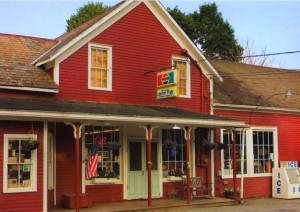Minimum-wage hike could spell end for VT’s iconic mom-and-pop shops

By Bruce Parker | Vermont Watchdog
ICONIC: Since 1850, the Wayside Country Store has contributed to the picturesque living that has come to be known as the ‘Vermont Brand.’
As lawmakers in Montpelier, Vt., prepare to hike the minimum wage to $10.10 an hour, the owners of an iconic family owned general store say the added payroll cost could force their store and hundreds like it to close-up shop for good.
As the most recent owners of the Wayside Country Store in West Arlington, Doug and Nancy Tschorn epitomize the iconic folksiness and small-town charm that lie at the heart of the famous “Vermont Brand.”
In the mid-1980s, the couple left a past of furniture refinishing to carry on a tradition that began in 1850, at the general store’s first opening.
But after three decades of serving hot coffee and warm conversation to locals, Doug Tschorn said he worries that Vermont’s family-owned mom-and-pop shops are on the brink of extinction.
“I doubt seriously that we can survive a minimum wage hike unless people are willing to pay the equivalent increase in goods, and I don’t think they will,” said Tschorn, a resident of Sandgate, a small town located in Bennington County.
“We’re a small family business. We’ve had the store for 30 years, and it was so much easier to operate in the past than it is today because of the pressures from the state.”
Since purchasing the store three decades ago, Tschorn and his wife have served Vermonters a broad range of merchandise, from groceries and souvenirs to deli foods and T-shirts. The store’s homey front porch and red-painted façade brim with local color.
Although Wayside Country Store has survived skyrocketing property taxes, state fees and increasing heat and electricity costs in recent years, Tschorn told Vermont Watchdog the minimum-wage proposal could spell the end for his business.
“Most of us store owners work on a profit margin of 1 percent. If the wage goes to $10.10 and hour, it would equate to approximately $16,000 a year increase in payroll — and that’s not counting Social Security and Medicare, ” he said.
Tschorn said a wage increase for entry-level workers affects other employees as well.
“If lawmakers raise the minimum by a certain amount, we would need to raise the rest of our people at least that much, and I don’t believe our leaders realize that,” he said.
Rob Roper, president of the Ethan Allen Institute, told Vermont Watchdog the burden placed on independent grocers threatens to erase the small-town life people imagine when they think of Vermont.
“They don’t make a lot of money, and they are already very fragile businesses. Any one of the barrage of anti-small-business mandates this Legislature is cooking up could sink these businesses,” Roper said.
Adding to the litany of government-caused costs for businesses, Roper said single-payer health care could result in a 29 percent sales tax and a 17 percent payroll tax — startling tax increases that Roper said would “shatter the iconographic Vermont general store.”
While layoffs and closings at IBM, Huber+Suhner and Plasan Carbon Composites have caught the attention of lawmakers in recent months, the plight of Vermont’s small businesses continues to go unnoticed.
“The Shaftsbury Country Store just closed in March, and Mach’s Market in Pawlet is fighting for his life — that’s just two stores within miles of me,” Tschorn said. “When I talk to Senator Dick Sears about the closing of the Shaftsbury Country Store or Mach’s Market, I don’t think it even rings a bell.”
George Malek, president of the Central Vermont Chamber of Commerce, said that’s what happens when government stifles small business and entrepreneurs.
“When a hundred businesses lay off one person each, no one even notices. They don’t even know that they’re gone,” he said.
Yet the cumulative impact on Vermont’s economy can be devastating.
Todd Keyworth, chairman of the board for the Vermont Grocers’ Association, told Vermont Watchdog that grocers make up 15 percent of the economy in the Green Mountain State. He said a hike in the minimum wage would pressure the association’s 600 member-organizations to cut hours, slash jobs and even close their doors.
The problem ultimately spreads to consumers, who are forced to cope with higher prices.
“Customers who are used to getting coffee and a doughnut every morning can’t afford the doughnut anymore,” Tschorn said.
The store owner said elected officials are to blame for playing politics with Vermont’s future.
“Governor Shumlin and most of the Legislature thinks a good way to get themselves re-elected is to pull this stuff out and do it without thinking of the consequences,” Tschorn said. “The big disconnect between our Legislature and us is that most of those people have never been in business, so they have no idea what goes on.”
Tschorn sees a bleak future for the state if lawmakers don’t get the message and reverse course soon.
“All you’re going to have living in this state is ultra-rich elderly people who can afford to pay the taxes, and the rest of the working world will be gone.”
Contact Bruce Parker at bparker@watchdog.org







